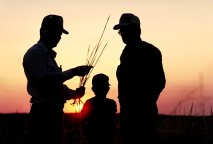|
|||
|
|
Farm Family Safety and Health Workshop Revised edition
Chapter 5: Gathering Community SupportIn rural communities, farm safety and health workshops are well received by local businesses, organizations, and civic groups. The following organizations are usually willing to assist with planning, sponsoring, or conducting a farm safety workshop. Cooperative Extension ServiceThe Cooperative Extension Service (CES) personnel in your county generally have extensive experience in developing educational programs. They can also provide access to the resources available through state Extension specialists at land grant institutions. Your county Extension Educators are often excellent candidates to serve as presenters for safety topics concerning agricultural machinery, farm chemicals, livestock, or grain handling. They should also be able to help promote the event through their newsletters and media contacts. Agri-BusinessesAgricultural equipment dealerships, feed and grain elevators, chemical suppliers, farm supply stores, and other rural businesses will often provide equipment, assist in organizing the program, and sometimes provide monetary sponsorship for refreshments, handout materials, or door prizes. Experts from rural businesses also make excellent presenters for topics in their respective areas of expertise. For example, a chemical dealer would be a natural choice for presenting information on safe pesticide storage and handling. Farm OrganizationsCounty Farm Bureau organizations, Granges, agricultural commodity groups, and other farm-related organizations have traditionally been avid supporters of farm safety and health efforts. Their involvement will help generate rural community support, as well as insure greater participation from their respective members. Farm organizations can also help identify volunteers, presenters, and local sponsors for your program. Other Local BusinessesSmall rural communities rely heavily on the farming industry for much of their business. Firms such as banks, retailers, restaurants, and others recognize the importance of the farm community to their business and are usually willing to help sponsor, conduct, or promote a program of this type. Electric Utility Companies and CooperativesElectric companies and cooperatives have excellent educational materials and presentations concerning electrical safety. These programs, which specifically highlight the dangers of electricity on farms and in rural areas, are often very popular with younger audiences. Civic GroupsOrganizations such as Rotary, Lions Clubs, Optimists, and others might see a farm safety workshop as an excellent opportunity to provide service to the community. In addition to volunteer and monetary support, civic groups can provide excellent publicity for your program. FFA and 4-H GroupsYouth groups are constantly looking for community service projects in which their members can participate. FFA chapters or 4-H clubs can provide much needed labor when promoting, setting up, and conducting the workshop. For children's workshops, older FFA and 4-H members can be utilized as tour guides, or even as instructors for certain topics. Some state FFA programs sponsor chapter safety awards, which can provide extra motivation for local chapters to become involved in community safety activities. Law Enforcement and Emergency ServicesLocal police and emergency response agencies are very supportive of injury prevention activities. Police officers, firefighters, and emergency medical technicians (EMTs) are excellent sources for a variety of presentations concerning safety and emergency response. Simulated farm rescues, such as extricating a dummy from farm machinery, make exciting demonstrations, and can reinforce important safety messages by showing the consequences of bypassing safety measures. Hospitals and Other Health Related OrganizationsHealth-care providers are great supporters of injury and illness prevention efforts. Such groups might provide speakers (e.g., first aid, emergency response) or educational materials (e.g., first aid kits, booklets, etc.) for workshops that focus on rural health-related issues. In some cases, the local hospital might provide free or reduced charge services for participants, such as blood or cholesterol screenings, hearing and vision tests, or skin cancer screenings. News MediaInvite local newspaper, radio, and TV personnel to participate in the planning of your farm safety program. This will help to ensure greater publicity for your workshop. A series of public service announcements on farm safety and health can be used to generate interest in your program. Follow-up reports on the event can extend the efforts of the workshop beyond the event itself, and deliver the safety message to a larger audience. See Chapter 6 for more information on publicizing your workshop. Last updated: 18-May-2006 11:08 AM
|
||


 Designed and maintained by the
Designed and maintained by the